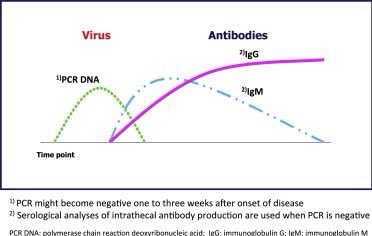So many friends/family asking me about testing for #COVID19. Here’s my attempt to explain using semi-friendly language. Not one for the purists!
1. To understand testing, it’s important to understand a bit of immunology. And also, a bit of molecular diagnostics.
1. To understand testing, it’s important to understand a bit of immunology. And also, a bit of molecular diagnostics.
2. An antigen is a molecule on the surface of cells such as bacteria and viruses. When your white blood cells recognise a foreign antigen they produce antibodies which attack the foreign invader and cause it to die. This is a key element of the immune response
3. Antigens are unique to their organism. That’s why, for example, if you catch chickenpox (varicella zoster antigen), you produce antibodies against it (varicella zoster antibodies), but you don’t then develop immunity to, say, measles virus  https://abs.twimg.com/emoji/v2/... draggable="false" alt="🦠" title="Microbe" aria-label="Emoji: Microbe">
https://abs.twimg.com/emoji/v2/... draggable="false" alt="🦠" title="Microbe" aria-label="Emoji: Microbe">
4. There are different types of antibody response! After an infection by a virus or a bacteria, first you produce IgM antibody, and then a bit later, IgG antibody (let’s ignore A and E for now). Clever body  https://abs.twimg.com/emoji/v2/... draggable="false" alt="👏🏼" title="Clapping hands sign (medium light skin tone)" aria-label="Emoji: Clapping hands sign (medium light skin tone)">
https://abs.twimg.com/emoji/v2/... draggable="false" alt="👏🏼" title="Clapping hands sign (medium light skin tone)" aria-label="Emoji: Clapping hands sign (medium light skin tone)"> https://abs.twimg.com/emoji/v2/... draggable="false" alt="👏🏼" title="Clapping hands sign (medium light skin tone)" aria-label="Emoji: Clapping hands sign (medium light skin tone)">
https://abs.twimg.com/emoji/v2/... draggable="false" alt="👏🏼" title="Clapping hands sign (medium light skin tone)" aria-label="Emoji: Clapping hands sign (medium light skin tone)"> https://abs.twimg.com/emoji/v2/... draggable="false" alt="👏🏼" title="Clapping hands sign (medium light skin tone)" aria-label="Emoji: Clapping hands sign (medium light skin tone)">
https://abs.twimg.com/emoji/v2/... draggable="false" alt="👏🏼" title="Clapping hands sign (medium light skin tone)" aria-label="Emoji: Clapping hands sign (medium light skin tone)">
5. There’s a timing gap between becoming infected with a virus and producing IgM antibody. Then another gap between IgM being produced and IgG being produced. See picture (using varicella IgM and IgG, but also varicella DNA - more later) which illustrates this
Just like us, viruses have genetic material, either RNA or DNA (see above) . The virus that causes #COVID-19 (SARS-CoV-2) is an RNA virus. You can use molecular techniques (“real-time” RT-PCR) to detect RNA virus even before antibodies are detectable. Genius!
These are the tests being used now for people unwell and in hospital with #COVID19-specific RT-PCR tests, and being rolled out to NHS staff who are self-isolating because they may have #COVID19 but need confirmation (if negative, they can go to work).
What about antibody tests? They are coming! But first they need to be evaluated to see how accurate they are. These will be blood tests, possibly, and because of the IgM/IgG timing issues (see #5), probably wont be done until some time – maybe a week – after symptoms develop.
So in summary, two types of test: RT-PCR (“antigen”) tests that are done by taking a swab and tell you if you are currently infected, and antibody (blood) tests that tell you if you have been infected at some point in the past.
The first is useful to inform if you are currently a risk to others and must stay at home (or, especially for frontline staff, if you are not infectious and so can go to work), the latter to see if you have had the infection and are now immune and so can return to normal life.

 Read on Twitter
Read on Twitter


